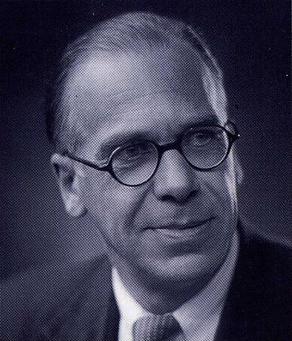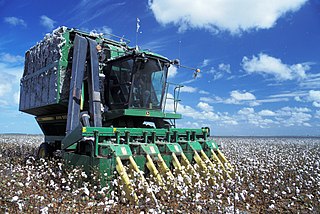
The Bracero Programs were the result of a series of laws and diplomatic agreements, initiated on August 4, 1942, when the United States signed the Mexican Farm Labor Agreement with Mexico. For these farmworkers, the agreement guaranteed decent living conditions and a minimum wage of 30 cents an hour, as well as protections from forced military service, and guaranteed that a part of wages was to be put into a private savings account in Mexico; it also allowed the importation of contract laborers from Guam as a temporary measure during the early phases of World War II.

William Alwyn, was an English composer, conductor, and music teacher.

Mechanised agriculture or agricultural mechanization is the use of machinery and equipment, ranging from simple and basic hand tools to more sophisticated, motorized equipment and machinery, to perform agricultural operations. In modern times, powered machinery has replaced many farm task formerly carried out by manual labour or by working animals such as oxen, horses and mules.
The Wheatland hop riot was a violent confrontation during a strike of agricultural workers demanding decent working conditions at the Durst Ranch in Wheatland, California, on August 3, 1913. The riot, which resulted in four deaths and numerous injuries, was subsequently blamed by local authorities, who were controlled by management, upon the Industrial Workers of the World (IWW). The Wheatland hop riot was among the first major farm labor confrontations in California and a harbinger of further such battles in the United States throughout the 20th century.

The Burston Strike School was founded as a consequence of a school strike and became the centre of the longest running strike in British history, that lasted from 1914 to 1939 in the village of Burston in Norfolk, England. Today, the building stands as a museum to the strike. Every year hundreds of people turn up for a rally to commemorate the 25-year strike over the jobs of Annie Higdon and her husband.
Maxim Anderson was a British director and producer of documentaries. He worked with the GPO Film Unit from 1936 onwards, and later changed to Crown Film Unit. He directed documentaries such as The Harvest Shall Come (1942) and Four Men in Prison (1950).
Arthur George Street, who wrote under the name of A. G. Street, was an English farmer, writer and broadcaster. His books were published by the literary publishing house of Faber and Faber. His best-known book was Farmer's Glory, describing his time in Canada and how he returned to Wiltshire.

The Migrant and Seasonal Agricultural Worker Protection Act, codified at 29 U.S.C. §§ 1801-1872, is the main federal law that protects farm workers in the United States and repealed and replaced the Farm Labor Contractor Registration Act.

The Harvest is a 2010 documentary film about agricultural child labor in America. The film depicts children as young as 12 years of age who work as many as 12 hours a day, six months a year, subject to hazardous conditions: heat exposure, pesticides, and dangerous work. The agriculture industry has been subject to significantly more lenient labor laws than any other occupation in the United States. As a result, lack of consistent schooling significantly limits their opportunities of succeeding in high school or more. The hazardous conditions threaten their health and lives. The purpose of the documentary is to bring awareness of the harsh working conditions which tens of thousands of children face in the fields of the United States each year and to enact the Children's Act for Responsible Employment which will bring parity of labor conditions to field workers that are afforded to minors in other occupations.
The Agricultural Workers Organization (AWO), later known as the Agricultural Workers Industrial Union, was an organization of farm workers throughout the United States and Canada formed on April 15, 1915, in Kansas City. It was supported by, and a subsidiary organization of, the Industrial Workers of the World (IWW). Although the IWW had advocated the abolition of the wage system as an ultimate goal since its own formation ten years earlier, the AWO's founding convention sought rather to address immediate needs, and championed a ten-hour work day, premium pay for overtime, a minimum wage, good food and bedding for workers. In 1917 the organization changed names to the Agricultural Workers Industrial Union (AWIU) as part of a broader reorganization of IWW industrial unions.
In the United Kingdom, a tied cottage is typically a dwelling owned by an employer that is rented to an employee: if the employee leaves their job they may have to vacate the property; in this way the employee is tied to their employer. While the term originally applied mainly to cottages, it may be loosely applied to any tied accommodation from a small flat to a large house. The concept is generally associated with agriculture, but may occur in a wide range of occupations.
Children's Act for Responsible Employment (CARE Act) is a United States bill that would address the labor conditions of child field workers by imposing the same age, work hour, and pesticide exposure limits as other occupations and increasing the penalties for child labor violations. Representative Lucille Roybal-Allard's introduced the Children's Act for Responsible Employment (CARE Act, HR 3564) bill in September 2009 and has subsequently reintroduced it.

The Soviet working class was, according to Marxist–Leninist theory, supposed to be the Soviet Union's ruling class during its transition from the socialist stage of development to full communism. However, according to Andy Blunden, its influence over production and policies diminished as the Soviet Union's existence progressed.
Builders is a 1942 British propaganda film, which outlines the importance of the work of builders during the Second World War. It was produced by Ian Dalrymple at the Crown Film Unit of the Ministry of Information and directed by Pat Jackson.

Britain at Bay is a 1940 British propaganda film produced by the General Post Office GPO Film Unit of the British Ministry of Information and distributed by the National Film Board of Canada. The film was written and narrated by noted author and political commentator J. B. Priestley.

The Harvest Gypsies is a series of articles by John Steinbeck written on commission for The San Francisco News focusing on the lives and times of migrant workers in California's Central Valley. Published daily from October 5 to 12, 1936, Steinbeck delves into the hardships and triumphs of American migrant workers during the Great Depression, tracing their paths and stories from crop to crop as they eked out a stark existence.

In 1933 there was a cherry strike in Santa Clara, California. The main overview of the events in Santa Clara was an agricultural strike by cherry pickers against the growers or employers. As the events of the labor strike unfolded, the significance of the strike grew beyond that of the workers themselves into a broader scope within America.

The Battle of the Harvests is an 18-minute 1942 Canadian documentary film, made by the National Film Board of Canada (NFB) as part of the wartime Canada Carries On series. The film was produced by James Beveridge and directed by Stanley Jackson, who also provided the narration. The Battle of the Harvests shows how the farmers were mobilized worldwide in a battle of harvests to serve the fighting nations during the Second World War. The film's French version title was La Bataille des récoltes.
Henry Pope Anderson was a farm labor union organizer, activist, author, and historian. He studied the Bracero program as a graduate student in Public Health at the University of California. He was Director of Research at Agricultural Workers Organizing Committee (AWOC), an early AFL/CIO-sponsored effort to unionize farm workers. Anderson organized and led Citizens for Farm Labor, a San Francisco Bay Area-based group that supported farm labor organization activities. He wrote the book “So Shall Ye Reap” documenting the history of farm labor unionization in California.











